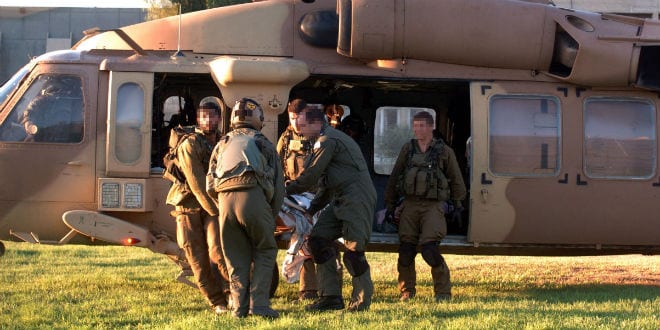The work of a soldier is rigorous and demanding, and puts immense strain on the body. As such, soldiers are often prone to pain and injury, which require quick diagnosis and treatment to enable them to return to duty. Yet in Israel, it is common for soldiers – and other patients – to wait months for an appointment, especially for certain diagnostic tests.
To alleviate this problem, the IDF has now leased its own Magnetic Resonance Imaging (MRI) machine for the exclusive use of soldiers, reducing wait times from months to mere days. The portable machine is one of five new units obtained across the country. The other four are to be located in several hospitals across the country: Hillel Yaffe in Hadera, Rebecca Sieff Hospital in Safed, Wolfson Medical Center in Holon, and Baruch Padeh Medical Center-Poriya in Tiberias.
MRI machines are expensive to buy and to run. Until now, Israel only had eighteen units across the country, including four portable machines that had to be shared by several hospitals. The demand for MRI testing is high enough that the machines are operated around the clock, so patients may wait weeks or more for an appointment, only to be told to arrive in the wee hours of the morning. The addition of the new units should allow more patients access to the diagnostic tool in a timely fashion.
The IDF’s machine, purchased by the Mor Institute and leased by the army, will be set up at the Tzrifin base in Rishon Lezion.
“This is the first time an MRI machine has been earmarked to be used on soldiers only,” head of the Imaging Department in the IDF Medical Corps, Lt. Col. Michel Somekh, told Israel HaYom.
“We’ve noticed gaps in the availability of these tests in the past two years, especially for IDF soldiers. We found ourselves sending soldiers for MRI scans at three or four o’clock in the morning, after waiting months.”
The machine is an important tool for the army in particular, Somekh explained. “Stress fractures are very typical in soldiers at different stages of their service. The system can identify them as well as damage to the joints, spine, shoulders, and knees. It also helps diagnose the causes of headaches, fainting, and migraines.”
The four hospitals getting new machines are also pleased. “An MRI system will provide a significant upgrade to the diagnostic and treatment capabilities, including the requisite tests, and of course will help improve the availability of the service to the population the medical center serves,” says Professor Meir Oren, director general of the Hillel Yaffe Medical Center.
“There is no doubt that the service will contribute to the quality of life of many patients in the area, who thus far have had to use mobile MRI services that weren’t available enough, often far from their homes.”
Wolfson Medical Center director Dr. Yitzhak Berlovich said the new machines would enable hospitals to run additional tests which depend on MRI, such as detecting breast cancer in women carrying the BRCA1 or 2 gene.
Even now, Israel has fewer MRI units per capita than the OECD average, with less than four machines operational per million residents. The average is fourteen. While the goal of the Health Ministry is to increase the number of available machines in the country, the cost is prohibitively high. According to the Ministry, “the number of machines in use in Israel should be increased. Health Minister Yael German and ministry Director-General Professor Arnon Afek are in talks with the Finance Ministry to find a way of doing that.”
MRI availability may not always be the problem, however.
“Even though in the past few years the number of MRI machines in Israel has grown, we unfortunately encounter cases where the health funds refuse to authorize an MRI scan, even when a doctor has ordered it,” says Shmulik Ben-Yaakov, chairman of the Society for Patients’ Rights in Israel.
According to Ben-Yaakov, “If there is a justified medical need and no other test, [patients] can appeal to the Public Complaints Commission or approach advocacy groups, including the Society for Patients’ Rights.”




